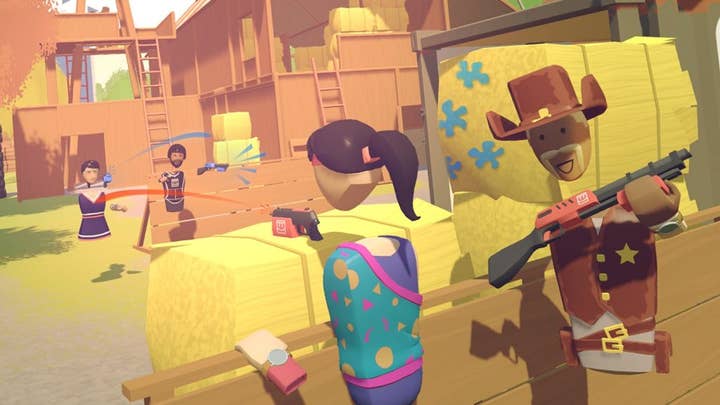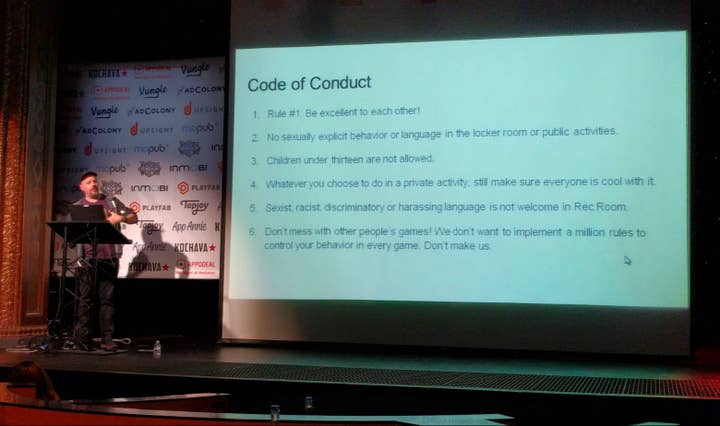Against Gravity: "Physical harassment in VR can be really intense"
CCO Cameron Brown on nurturing Rec Room's thriving community, and the "very real" sense of physical threat in a virtual world
The importance of building welcoming, inclusive communities around video games grows stronger by the year, but the advent of virtual reality has raised a variety of new issues for developers creating social experiences. Speaking at Casual Connect USA last week, Against Gravity co-founder and CCO Cameron Brown detailed how the Seattle-based company approached these problems in its social VR space, Rec Room.
At this early stage in the market legitimate VR hits can be difficult to find, but while Rec Room is free to download, all of the available data points towards success. Steam Spy puts the game's total owners at almost 265,000 people, and that doesn't include downloads through the Oculus Store. When Against Gravity raised $5 million in new funding in February, it said that more than 100,000 unique users had entered Rec Room in the second half of 2016 - a figure that has almost certainly increased in the first half of this year.
"Rather than just put you into a room and expect you to socialise, we give you something to do"
For Brown, though, Rec Room's customer rating on Steam is a clear point of pride; the reviews since it launched in June 2016 have been good enough to earn it the rare "Overwhelmingly Positive" designation, which has proved to Brown that, "there's a very hungry audience out there for social VR experiences. There's something here that people connect to and really love."
More importantly, those reviews indicate that Against Gravity has delivered against the broad goal it set for Rec Room at the very start. "Rec Room is a fun and welcoming environment for people from all walks of life," Brown said, recounting what he described as the "motto" Against Gravity's team adhered to throughout development. "We say this routinely, probably weekly, and we put this out into the community when we're on the forums."
Brown described Against Gravity's approach to design as "structured social," which recognises the importance of giving players activities to engage with in forging bonds and working against the "bad actors" that are present in any online community.
"Rather than just put you into a room and expect you to socialise, we give you something to do," he said. "By the end of the night you've gone on a magical quest, you've shot paintballs at each other, and you've had fun. Before you know it, you've made a friend."

Quest is a co-op adventure game within Rec Room, and there are competitive activities like Paintball a squash-style racket sport called Powerball. The most enthusiastic users can rack up hundreds of hours in these activities, Brown said, and they strengthen the community by bringing people together.
"We've seen it over and over again; the best experience a new player can have in Rec Room is when they find someone who can show them the ropes, and be their chaperone. The more you can encourage that and maximise the chance of that happening, the healthier your community will be."
Brown advised the Casual Connect audience that reaching a point where this kind of community can flourish involves, "setting the tone from day one." Against Gravity's guiding motto was part of that process, but Brown also drew inspiration from a real-world institution that has long been associated with inclusive and welcoming values.
"I was thinking about who does this successfully; who welcomes people from all walks of life, on a daily basis? I thought the YMCA was a good starting point, and they have a Code of Conduct. Ours is not the same, but the idea of an artefact that players can point to and say, 'Hey, these are the rules.' That's a very powerful social tool."

The set of rules in the photo above have been an ever-present feature of Rec Room's virtual world and online forums since its earliest days. The Code of Conduct was designed to encompass a variety of potential issues, from the likelihood of young children entering the space - "parents see Rec Room as a very interesting babysitting option" - to the abundant examples of vulgar and anti-social behaviour in online communities of all kinds.
"It won't shock anyone to know that there's a pretty low time to penis in social VR experiences," Brown said, drily, but those with a penchant for drawing male genitalia need only be pointed towards rule #2 on the Rec Room Code of Conduct.
"It won't shock anyone to know that there's a pretty low time to penis in social VR experiences"
"We've found that players are very good at policing each other," Brown added. "This has become part of the community DNA, and in the event that we do have to suspend someone or ban someone, or just talk to someone about their conduct in Rec Room, it's really helpful for us to be able to point to this thing that they know exists.
"It's front and centre in the game, and I definitely recommend that any social VR experience have something like this."
According to Brown, some best practices from community management in non-VR games are transferrable, but the immersive nature of the medium raises new issues when it comes to various forms of harassment. "Social VR adds this very physicalized component to it," he said, which can trigger feelings in the "monkey brain" that will be unfamiliar to players flat-screen games like Call of Duty or League of Legends.
While there aren't any more "bad actors" in social VR experiences than anywhere else online, Brown said that their actions can have a far greater impact. As such, Against Gravity had to implement a system that allowed users to clearly see who's talking at any given moment - "it's surprisingly difficult," Brown noted, "even with spatial audio" - and it went through several iterations of tools for muting and ignoring other players.
"We think of this as an ongoing, never ending system that we have to maintain"
The first solution to this was buried in a menu, which a user could call up if they felt they were being verbally harassed and select another user to silence. However, this "functional but clunky" system didn't account for the way immersive VR can magnify subjective experience.
"We had a female player who said she'd been harassed in Rec Room, and she had friends there who were trying to support her," Brown said. "They had her back, and they were reporting the person who was doing this to her. But from her perspective, what she saw was them disengaging from the situation and starting to interact with a piece of UI.
"Even though she knew intellectually that they were helping and intervening on her behalf, it felt very demoralising that they were disengaging their attention and digging through a menu."
Ultimately, Against Gravity landed on a more direct and empowering solution. When someone encounters verbal aggression in Rec Room now, a user can employ a "talk to the hand" gesture; by raising and holding a hand in front of another avatar a timer is triggered, at the end of which the offending user will be muted and a menu of options to take further action will open.
"This gesture has been much more effective," Brown said. "You're not disengaging; you're doing something that shows your intent, and it's very easy to remember under pressure."
"People don't believe it until they experience it, but it's very real... Physical harassment in VR can be really intense"
The difficulty of recalling processes under pressure was also present in dealing with another, more serious problem: physical harassment, which Brown maintains is often overlooked when it comes to social VR. He referred to the example of approaching a steep drop in VR, which can trigger a strong sense of fear and vertigo in the user.
"It really confronts something primal in your brain, even though you know intellectually that you're safe," Brown said. "There's something very similar in social VR; when someone invades your personal space, when someone gropes at your private areas, when someone makes obscene gestures at you, it really freaks you out.
"It's counter-intuitive; most people don't seem to believe it until they experience it, but it's very real... Physical harassment in VR can be really intense. It can really spoil your day."
Upon observing this effect, Against Gravity concluded that the best solution would be one that, "made it very easy for you to reclaim your autonomy." One iteration allowed the user to emit a "pulse of energy" that turned everyone around them into ghosts; translucent, armless, silent, white-sheet-over-the-head ghosts.
It wasn't effective, Brown said, the combination of abstract imagery ultimately confusing Rec Room's players. More importantly, in the heat of the moment a harassed user would forget that it even existed.
Again, the best idea was more subtle, and in this case more passive. Instead of implementing a system that required someone to be harassed before it became effective, Against Gravity created an "ignore bubble" around each avatar that is turned on by default. Each user can adjust the parameters of this bubble, but whenever another avatar enters it their physical and vocal presence fades away.
"Some players don't care about this, but a lot of people do," Brown noted, ending his talk with a parting reminder of the amount of work Against Gravity has put into growing and safeguarding Rec Room's thriving community.
"If you're going to build a social VR experience, I would expect to spend at least 10% of your development on moderation features," he said. "We think of this as an ongoing, never ending system that we have to maintain."
GamesIndustry.biz is a media partner of Casual Connect USA. We attended the conference with assistance from the organiser.










